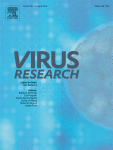Ver ítem
- xmlui.general.dspace_homeCentros e Institutos de InvestigaciónCICVyA. Centro de Investigación en Ciencias Veterinarias y AgronómicasInstituto de BiotecnologíaArtículos científicosxmlui.ArtifactBrowser.ItemViewer.trail
- Inicio
- Centros e Institutos de Investigación
- CICVyA. Centro de Investigación en Ciencias Veterinarias y Agronómicas
- Instituto de Biotecnología
- Artículos científicos
- Ver ítem
The autographa californica multiple nucleopolyhedrovirus Ac12: A non-essential F box-like protein that interacts with cellular SKP1 component of the E3 ubiquitin ligase complex
Resumen
The Autographa californica multiple nucleopolyhedrovirus (AcMNPV) ac12 gene, which is conserved in ten other baculovirus, codes a predicted 217 amino acid protein of unknown function. In this study, we investigated the role of ac12 during baculovirus infection, by generating an ac12 knockout virus. The transfection of the recombinant genome in insect cells resulted in unaltered viral dispersion and occlusion body production when compared to the control
[ver mas...]
The Autographa californica multiple nucleopolyhedrovirus (AcMNPV) ac12 gene, which is conserved in ten other baculovirus, codes a predicted 217 amino acid protein of unknown function. In this study, we investigated the role of ac12 during baculovirus infection, by generating an ac12 knockout virus. The transfection of the recombinant genome in insect cells resulted in unaltered viral dispersion and occlusion body production when compared to the control bacmid. This finding demonstrates that ac12 is a non-essential gene. Transmission and scanning electron microscopy (SEM) analyses showed that ac12 knockout virus produced occlusion bodies morphologically similar to those obtained with the control and capable to occlude virions. However, a slight but significant size difference was detected by SEM observation of purified occlusion bodies. This difference suggests that ac12 may be involved in regulatory pathways of polyhedrin production or occlusion body assembly without affecting either viral occlusion or oral infectivity in Rachiplusia nu larvae. This was evidenced by bioassays that showed no significant differences in the conditions tested. A qPCR analysis of viral gene expression during infection evidenced regulatory effects of ac12 over some representative genes of different stages of the viral cycle. In this study, we also showed that ac12 is transcribed at early times after infection and remains detectable up to 72 hours post-infection. The mRNA is translated during the infection and results in a protein that encodes an F-box domain that interacts in vivo and in vitro with S phase kinase associated protein 1 (SKP1) adaptor protein, which is potentially involved in protein ubiquitination pathways.
[Cerrar]

Autor
Costa Navarro, Guadalupe Soledad;
Amalfi, Sabrina;
Lopez, Maria Gabriela;
Llauger, Gabriela;
Arneodo Larochette, Joel Demian;
Taboga, Oscar Alberto;
Alfonso, Victoria;
Fuente
Virus research 260 : 67-77. (15 January 2019)
Fecha
2019-01
Editorial
Elsevier
ISSN
0168-1702
Formato
pdf
Tipo de documento
artículo
Palabras Claves
Derechos de acceso
Restringido
 Excepto donde se diga explicitamente, este item se publica bajo la siguiente descripción: Creative Commons Attribution-NonCommercial-ShareAlike 2.5 Unported (CC BY-NC-SA 2.5)
Excepto donde se diga explicitamente, este item se publica bajo la siguiente descripción: Creative Commons Attribution-NonCommercial-ShareAlike 2.5 Unported (CC BY-NC-SA 2.5)

